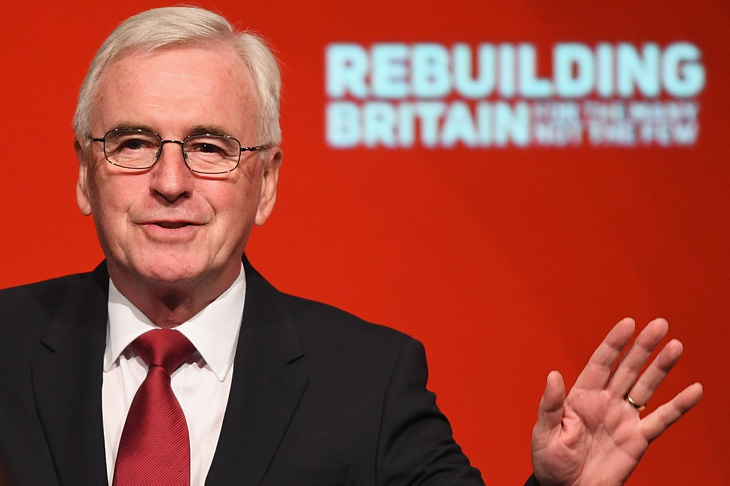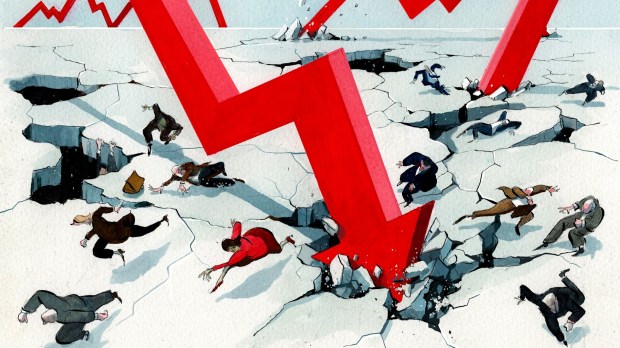The least convincing thing said by Labour shadow chancellor John McDonnell at the Labour party conference in Liverpool was ‘I believe we’ll be elected for a second term.’ In all his other remarks about plans for compulsory employee share schemes, workers on boards, higher corporate taxes, extended employment rights, attacks on the rich and below-market renationalisation of water utilities whose bosses he would fire, he talked about getting the programme done ‘within the life of a Labour government’ — with the clear implication that he thinks Tory turmoil might be about to give him a once-in-a-lifetime, one-term-only chance to make a reality of the recreation he lists in Who’s Who: ‘fermenting the overthrow of capitalism.’
Reaction from business was surprisingly muted, perhaps because no one in Britain’s boardrooms believes it could really happen, perhaps because the fat cats don’t want their names and addresses on McDonnell’s Stasi watch-list. The BBC helpfully found some positive vox pops and a Sheffield engineering firm with an employee share scheme that made it all sound quite plausible.
But imagine that Mrs May is forced to call an early general election and manages to lose it narrowly to Jeremy Corbyn, who is then shouldered aside by McDonnell and his Trotskyite clique. A stock market crash, a flight of gilt investors and a credit crisis would only be the start. I’m reminded of the veteran entrepreneur who sent me last year a list of topics then under discussion with his team in relation to just such a scenario: ‘Move personal as well as corporate assets overseas. Consider emigration to lower tax environment. Change strategy to make little or no profit in UK. Cancel all UK investment plans. Investigate sale of business or generally put business into hibernation.’
Amid the misadventures of current politics, no electoral outcome is too far-fetched to contemplate. Don’t listen to what the shadow chancellor says about ‘inclusive ownership’ and ‘unprecedented openness’: look at the glint in his eye. He’s a man on a mission to destroy the free-market economy as fast and as comprehensively as he can. The Tory party might one day be forgiven for making a pig’s ear of Brexit, but not for putting John McDonnell in power.
Diesel is dying
Two footnotes to my thesis last week that the UK and European automotive industry is besieged by problems of which Brexit supply-chain disruption is merely the one making the most headlines. First, BMW announced that its Mini plant at Cowley will close for a month immediately after Brexit, to avoid the risk that it will be halted anyway for lack of imported parts. This brings forward a ‘routine summer maintenance shutdown’ and allows the factory to equip for a new electric model, but also reflects fears that orders will slump in the spring.
Secondly, Porsche announced it will no longer make diesel cars. Analysis of the latest diesel engines (in the Mercedes CLS, for example) reveals they are cleaner than their petrol equivalents in CO2 and particulate emissions, and only fractionally worse in nitrogen oxide. But as demand for electric and hybrid cars rises, diesel’s bad reputation makes it ever harder to sell — leaving manufacturers to rewrite business plans accordingly. This industry really is an economic bellwether, and at risk of turning the column into something out of Top Gear magazine, I’m keeping a very close eye on it.
City success story
A City deal that deserved more attention last week was the £4.3 billion agreed bid for insurance broker Jardine Lloyd Thompson by the US giant Marsh & McLennan. Lloyd Thompson was an entrepreneurial start-up in the early 1980s, during the darkest days of the scandal-torn Lloyd’s insurance market. Merger in 1997 with the insurance arm of Jardine Matheson, the Hong Kong trading house and Keswick family fiefdom, made it London’s third-ranked broker after Sedgwick and Willis Corroon. In recent times it has ranked seventh in the world.
One of the firm’s early thrusters was a pale young man called Jonathan ‘Chalky’ Marland, who went on become Tory party treasurer and a minister in the House of Lords. If he’s still a JLT shareholder, he’ll be celebrating, with former colleagues and the Keswicks (who had 40 per cent), an exit at £19.15 per share that represents a 38 per cent premium to the market price and, I’m guessing, a colossal multiple of what they all paid for their shares in the first place. Some jobs will be lost in the combined firm but the pay-out will surely be good news for Home Counties swimming-pool builders.
Betting on Britain
Marsh & McLennan was emboldened to offer such a rich price for JLT by the weakness of the pound, which at $1.30, down from $1.45 before the 2016 referendum and $1.70 a couple of years before that, makes almost anything over here (except the highest of high-end real estate) look attractively cheap. Hence, in a lively global market for mergers and acquisitions, a reported doubling — to £79 billion — in the value of UK companies acquired by US buyers in 2017-18 compared to the previous year.
We can expect a lot more of the same if the pound continues to fall as the chances rise of Mrs May achieving no deal or a very bad one. But there are those — led by the former Labour donor and Leave campaigner John Mills — who argue a substantially weaker pound is exactly the adrenaline shot we need to boost export competitiveness as well as inward investment in the new world we’re about to enter. None of that will really matter, of course, if by some electoral mishap Labour comes to power and John McDonnell seizes his opportunity to turn us into the new Venezuela. But let’s take what comfort we can from Marsh & McLennan chief Dan Glaser, who told the FT: ‘Brexit creates some short-term uncertainty. So what? We’re happy to bet on Britain.’
Got something to add? Join the discussion and comment below.
Get 10 issues for just $10
Subscribe to The Spectator Australia today for the next 10 magazine issues, plus full online access, for just $10.
You might disagree with half of it, but you’ll enjoy reading all of it. Try your first month for free, then just $2 a week for the remainder of your first year.















Comments
Don't miss out
Join the conversation with other Spectator Australia readers. Subscribe to leave a comment.
SUBSCRIBEAlready a subscriber? Log in